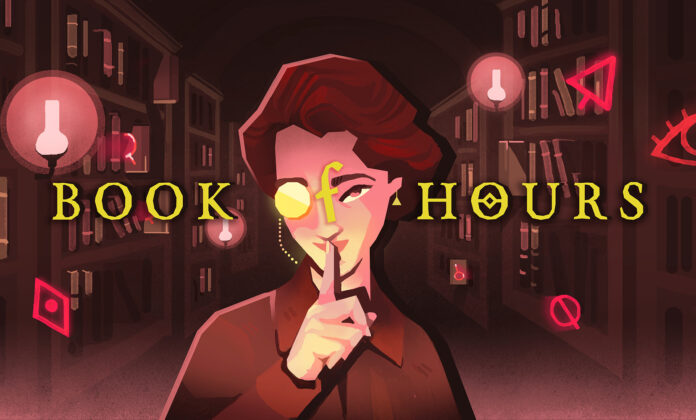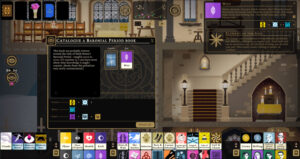First of all, it’s necessary to clarify that this review was written during an ongoing, initial playthrough of the game. It hasn’t been out long, I’m only human, and there is quite a lot present to read and learn; there are things that will likely change or might be more fully answered by a succession of comprehensive playthroughs. Now, with that said…
Becoming the librarian and curator of an occult book collection is a need I’ve never had met until Book of Hours came out.
Based in Alexis Kennedy’s Secret Histories setting, Book of Hours is a kind of spiritual successor to 2018’s Cultist Simulator.
Book of Hours sees you take on the role of a librarian dispatched to the enigmatic manor known as Hush House, located adjacent to the Cornish village of Brancrug. Your ship gets caught in a storm and capsizes, but you manage to wash up on the beach at Brancrug anyway, leaving you to carry out your goal once you’ve found shelter with an old friend of yours who lives in the village.
Your ostensible task: restore Hush House and its occult book collection to splendorous glory on behalf of the mysterious St. Rhonwyn’s Trust. It’s implied by the backstory you choose (your first major choice of the game, in fact, and one that suggests which of the game’s many endings you’ll most likely go for) that you’re escaping something in your past by taking on the role of librarian, something you’re working to remove from your life completely.
Like its successor, Book of Hours is a card and crafting game, where entities in the game (people, emotions, character traits) are represented by cards, which are used in various ways with the game’s core actions: you interact with the world primarily through Talking to individuals and Considering objects. Unlike Cultist Simulator, however, there are plenty of objects present in the game’s play space, which is the village and manor house itself. The house is filled with all kinds of objects; furniture, wall art, food and beverages, strange objets d’art, and, of course, books. You have a limited carryable inventory space of five slots, which you can use to carry these objects, but in general they’ll occupy the game space.
In its way, this distinguishes it from its predecessor in terms of focus and immersion; while the cult leader you play in Cultist Simulator always feels detached from the world itself, hyper focused on their goal of immortality and ascension, thus considering everything only in terms of how it might help or hinder that goal, Book of Hours very much integrates the librarian into the world; it’s a more narrow focus with a lot more density of detail, and grounds the librarian firmly into the world.
Your two major drives are to restore the rooms of the ruined manor house, and to catalogue the many, many (possibly hundreds, I keep finding more and more) books you find in the place. When a book is first encountered, you don’t know its title, but you do know which of the manor’s time periods it belongs to by the colour of the paper it’s wrapped in. Once you Consider a book, you discover its title, a summary of what it’s about, and what kind of mystery it involves… and whether or not it’s cursed or contaminated in some way.
Both of these are approached in similar ways: finding the right combination of elements of the soul (your attributes), skills (which you can develop by learning more occult knowledge from the books you Consider), tools or things (sometimes even just sitting in the right chair or having a good cup of tea can help you crack a troublesome tome), and transitory ephemera (memories and the day’s weather have aspects of their own) to meet the book or room’s requirements to unlock or comprehend. Once you meet a book’s challenge, it provides you with a skill card or two, and some snippets of the lore.
When clearing rooms of the manor house, you can spend some of your all too scant yearly stipend from St Rhonwyn’s Trust to hire on locals from the village (or ask your initial friendly contact, who’ll always help you for free) for assistance in restoring Hush House. You can even, in the great British tradition, Talk to them about the weather to boost how much of a particular principle they have for the day, which becomes a necessity as you venture deeper into the manor and the challenges escalate ever further.
It’s not dissimilar to the expeditions present in Cultist Simulator, but is benefited greatly by one of Book of Hours quality of life improvements over Cultist Simulator; you’re told what kind challenge the book you’re trying to catalogue involves, and therefore exactly how much of the 12 principles you need to complete the challenge you face. That itself is a departure from Cultist Simulator; the 9 principles (Edge, Forge, etc) underpinning the Secret Histories setting have been expanded to include 4 more, called Scale, Nectar, Moon, and Sky. And Secret Histories (the principle) has been removed as a distinct entity, though really it underpins everything you’re doing in the game.
Your other major goal is to fill the Tree of Wisdoms, by committing skill cards to the nine slots available to each of the 9 Wisdoms (including Hushery, and the incomprehensibly named Skolekosophy), trying to hone your skill in one field all to maximum as you seek out an ending. By committing skill cards, you gain extra element of the soul cards, allowing you to do more and meet bigger challenges. Once a skill is committed to the Tree of Wisdoms, it cannot be uncommitted, so be very careful which skills you commit where.
Mercifully enough, there is another major change between the two games. Cultist Simulator was constantly trying to kill your character in two or three different timers at once, and it was a struggle to stay ahead; Book of Hours has a far more sedate and relaxed pace, with few time pressures that involve real consequences and, to the best of my knowledge, nothing that kills your character.
Elements of the soul cards you commit to tasks become fatigued by use and simply refresh at the start of every new in game day, presumably after your librarian has a good night’s sleep, though you can pack more into a day by having a meal at the local pub to refresh individual aspects for the small price of two pence (for better or worse, Book of Hours has money in pre-decimal UK currency… good luck remembering how many pennies are in a half-crown). Sometimes when you commit these cards to book challenges that fail, one of the cards committed to the task can become damaged and unusable, usually requiring the right combination of bed rest and beverages to recover. Despite the lower pressure, trial and error as you look for combinations of cards that work together are key to the core gameplay, same as Cultist Simulator.
There is a considerable amount of detail to consider, each of the many rooms of the manor are full of all sorts of objects to consider and books to catalogue, but thankfully the soft, colourful art style makes this a pleasure rather than a chore… though you may want to keep a notebook handy to keep track of things as you play, as there is no tutorial and little guidance in Book of Hours at all.
There are plenty of hidden nooks and crannies scattered throughout, even on the main menu if you look carefully and investigate.
Though the general quality of life improvements and calmer pace feel like help enough after Cultist Simulator, frankly.
This won’t be a game for everyone, but it scratches that particular itch of the esoteric and pursuit of secret knowledge, as well as gives you plenty to puzzle over. If you like that kind of thing, or you enjoy a setting that has an extremely rich and detailed tone and history, Book of Hours might be for you.
Book of Hours is available for £19.99 for Windows, Mac, and Linux from Good Old Games and Steam.
Help keep news FREE for our readers
Supporting your local community newspaper/online news outlet is crucial now more than ever. If you believe in independent journalism, then consider making a valuable contribution by making a one-time or monthly donation. We operate in rural areas where providing unbiased news can be challenging. Read More About Supporting The West Wales Chronicle






















